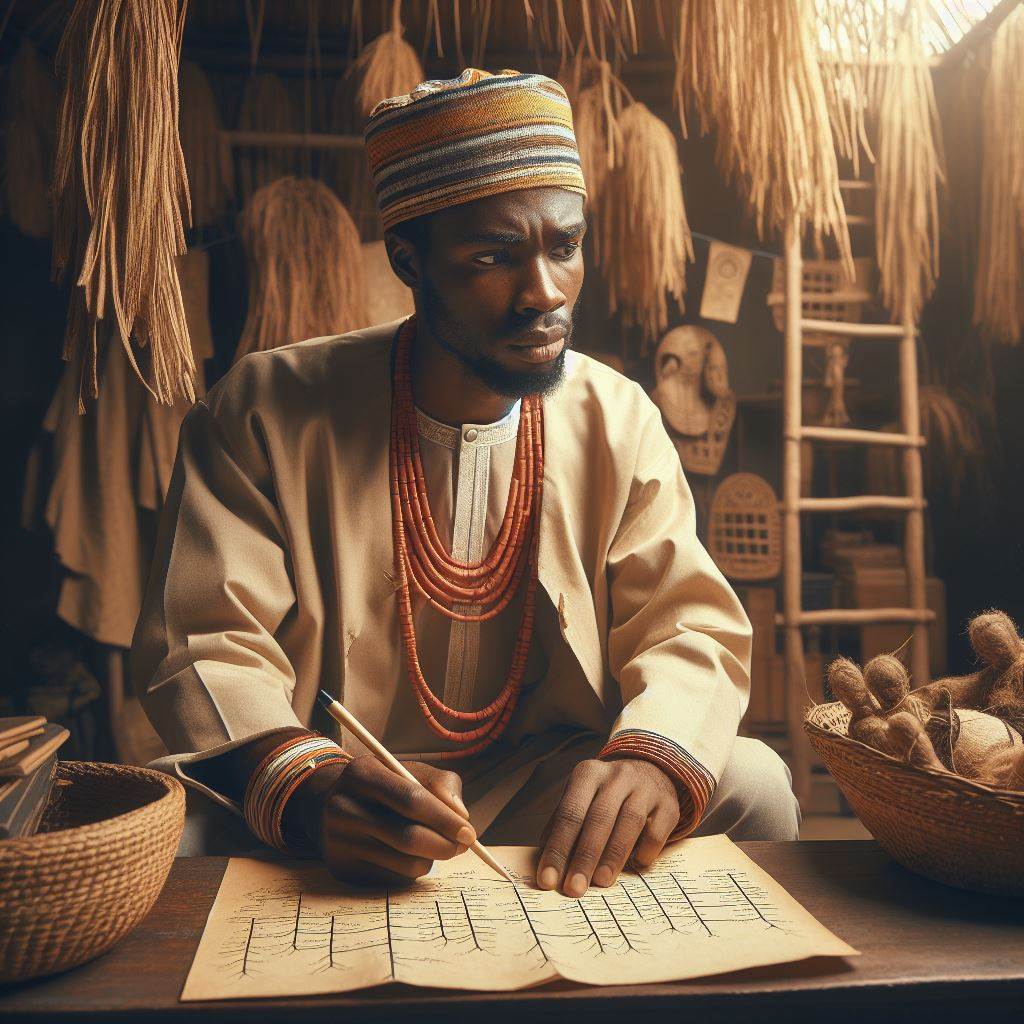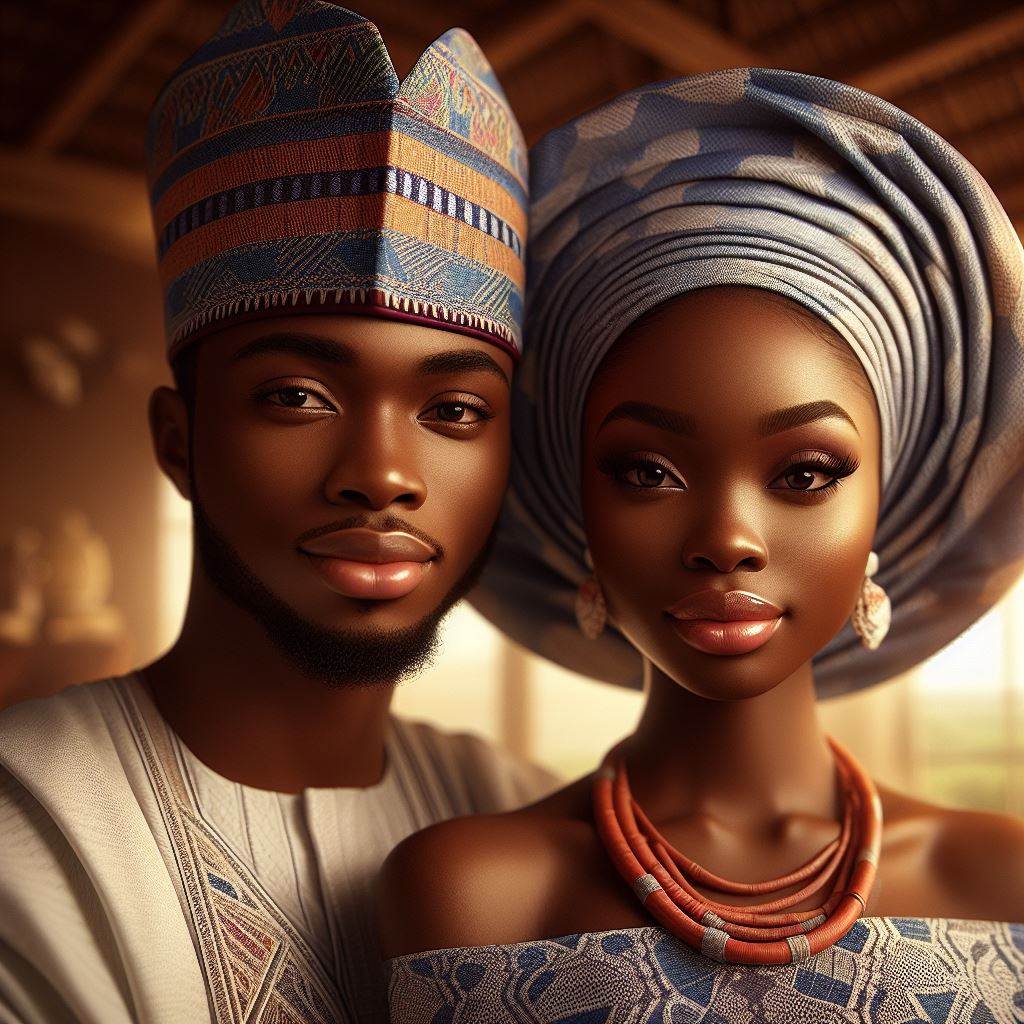Introduction
Understanding Anthropology
Anthropology is the study of humans, their societies, and their cultural developments. It helps us understand human diversity and complexity. Anthropologists examine various aspects of human life, including family structures, to comprehend social dynamics.
Importance of Studying Family Structures
Family structures are fundamental in shaping societies. They influence cultural norms, values, and socialization processes. In Nigeria, diverse family structures reflect the country’s rich cultural heritage.
Studying these structures provides insights into the societal organization and cultural practices of Nigerian communities.
Overview of Key Points
This blog post will explore Nigerian family structures and their anthropological significance. We will discuss traditional family systems, the impact of modernization, and the role of extended families.
Additionally, we will examine gender roles and the influence of religion on family dynamics.
Traditional Nigerian Family Systems
Patriarchal and Matriarchal Systems
Many Nigerian societies have patriarchal family systems, where men hold primary authority.
However, some communities have matriarchal structures, where women play central roles. These systems dictate family roles, inheritance, and leadership within the household.
Extended Family Importance
The extended family is a crucial element in Nigerian culture. It includes grandparents, uncles, aunts, and cousins, not just the nuclear family. This network provides emotional, financial, and social support, fostering strong communal ties.
Modernization and Its Impact
Shift Towards Nuclear Families
Modernization has led to a shift towards nuclear families in urban areas. Economic pressures and urban migration contribute to this change. Nuclear families consist of parents and their children, unlike the traditional extended family setup.
Changing Gender Roles
Modernization has also influenced gender roles within families. Women increasingly participate in the workforce, challenging traditional domestic roles. This shift impacts family dynamics and decision-making processes.
The Role of Religion
Influence of Christianity and Islam
Christianity and Islam significantly influence Nigerian family structures. These religions shape family values, marriage practices, and gender roles. Religious teachings often reinforce traditional family hierarchies and responsibilities.
Traditional Beliefs and Practices
Despite the prevalence of Christianity and Islam, traditional beliefs remain influential. Many Nigerians integrate indigenous practices with religious teachings. This blend creates unique family customs and rituals.
In review, Nigerian family structures are diverse and dynamic.
Understanding these structures through anthropology reveals the complexities of Nigerian society. Traditional systems, modernization, and religion all play significant roles.
Importance of Continued Study
Studying Nigerian family structures is crucial for appreciating the country’s cultural diversity. It helps us understand the interplay between tradition and modernity.
Continued anthropological research can provide deeper insights into the evolving nature of Nigerian families.
By examining these elements, we gain a holistic understanding of Nigerian family structures. This knowledge fosters greater appreciation and respect for Nigeria’s rich cultural heritage.
Overview of Nigerian Family Structures
Traditional Nigerian Family Structure
The traditional Nigerian family structure is predominantly patriarchal. Fathers are the heads of households and primary decision-makers.
Nigerian families are typically extended, including not just nuclear members but also grandparents, uncles, aunts, and cousins.
These extended families often live together or in close proximity, fostering a strong sense of community and shared responsibility.
In many Nigerian cultures, families are polygamous. Men can have multiple wives, and each wife has her own household within the larger family compound.
This structure supports large families, providing economic benefits and social stability. Polygamy also ensures that wealth and property remain within the family.
Family lineage and heritage are crucial in Nigerian societies. Children are considered the continuation of the family legacy. The family name carries significant weight, and maintaining its honor is of utmost importance.
Roles of Family Members
Fathers
Fathers in Nigerian families hold authority and responsibility. They provide for the family’s financial needs and make key decisions.
Fathers also play a vital role in guiding and disciplining children. They are seen as the protectors and providers of the family.
Mothers
Mothers manage the household and care for the children. They handle daily chores, cook meals, and ensure the family’s well-being.
Mothers also play an essential role in nurturing and educating children. They instill cultural values and traditions in their offspring.
Children
Children are highly valued and expected to respect their elders. They assist with household chores and often help in family businesses or farms.
Education is encouraged, and children are seen as future caretakers of the family. They are raised with a strong sense of duty towards their parents and extended family.
Extended Family Members
Extended family members provide additional support. Grandparents often help in child-rearing and imparting cultural knowledge.
Uncles and aunts can act as secondary guardians. Cousins grow up together, forming close-knit bonds akin to sibling relationships.
Valuing Family Relationships in Nigerian Culture
In Nigerian culture, family relationships are deeply cherished. Loyalty to family is paramount, and individual actions reflect on the entire family. Major decisions, like marriage and career choices, often involve family consultation and approval.
Social gatherings and ceremonies reinforce family ties. Weddings, naming ceremonies, and funerals are significant events where families unite and strengthen their bonds.
These gatherings are opportunities to celebrate and uphold family traditions.
Respect for elders is a core value in Nigerian families. Elders are revered and their advice is highly respected. Younger family members show deference through gestures, language, and behavior.
This respect extends beyond the immediate family to the broader community.
Mutual support is a cornerstone of Nigerian family life. Families provide emotional, financial, and social support to their members. This support network ensures stability and resilience in times of need.
To summarize, Nigerian family structures are complex and rooted in cultural traditions. The roles within the family are well-defined, with each member contributing to the family’s welfare.
Family relationships are highly valued, reinforcing the strong communal bonds that characterize Nigerian society.
Read: How to Apply for Communication Arts Programs
Impact of Colonialism on Nigerian Family Structures
Colonialism, a defining epoch in Nigerian history, reshaped traditional family structures profoundly.
Introduction of Western Ideas and Values
Under colonial rule, Nigerian families encountered a wave of Western ideas and values.
The imposition of Western norms disrupted traditional family roles and dynamics.
Western education introduced new ideologies, challenging traditional family authority structures.
Long-Term Effects of Colonialism
The legacy of colonialism lingers in Nigerian family dynamics to this day.
Economic shifts led to the breakdown of traditional family economies.
The nuclear family model supplanted the extended family system.
Colonial policies favored individualism over communalism, altering social cohesion.
Western legal systems replaced customary laws, impacting family governance.
The erosion of traditional values created intergenerational conflicts within families.
Christianity and Islam, introduced during colonialism, reshaped religious practices within families.
Urbanization, a consequence of colonial economic policies, fragmented familial bonds.
Colonialism’s Societal Disruptions
Colonialism’s societal disruptions fractured the fabric of Nigerian family structures.
Economic exploitation upended traditional gender roles and family responsibilities.
Land alienation policies destabilized agrarian-based family systems, triggering social dislocation.
Transform Your Career with Expert Guidance
Get personalized mentorship consulting that’s tailored to your unique path. Our expert advice is actionable and exclusive.
Get StartedThe colonial administration’s divide and rule tactics fostered inter-ethnic tensions, straining familial ties.
Resilience and Adaptation
Despite colonial disruptions, Nigerian families exhibited resilience and adaptability.
They synthesized traditional and Western values, forging hybrid family structures.
Survival strategies emerged, bolstering familial bonds amidst societal upheaval.
Colonialism wrought profound changes on Nigerian family structures, reshaping norms and values.
While its impact persists, Nigerian families have shown remarkable resilience in navigating these challenges.
Understanding the influence of colonialism on family dynamics is crucial for comprehending contemporary Nigerian society.
In essence, the legacy of colonialism serves as a lens through which to examine the evolution of Nigerian family structures.
Implications for the Future
Reflecting on colonial legacies can inform efforts to address contemporary family issues in Nigeria.
Promoting cultural heritage and community cohesion can counteract the lingering effects of colonialism.
Policy interventions should prioritize the restoration of traditional family values while embracing modern realities.
In doing so, Nigerian families can reclaim agency over their narratives and chart a path towards a more equitable future.
In summary, the influence of colonialism on Nigerian family structures underscores the interconnectedness of history, culture, and societal evolution.
Read: Introduction to African and Asian Studies in Nigeria
Changes in Nigerian Family Structures
Modernization and Globalization Influence
Modernization and globalization have profoundly impacted Nigerian family structures. Traditional norms are gradually evolving as a result.
Urbanization, accompanied by increased exposure to diverse cultures and lifestyles, has led to shifts in familial dynamics. Families are adapting to new ways of living influenced by urban settings.
Impact of Urbanization on Traditional Family Values
Urbanization has challenged traditional family values in Nigeria. The close-knit extended family model is giving way to nuclear families due to migration to cities. This shift is altering the dynamics of intergenerational relationships.
Examination of Role of Education and Economic Opportunities
Education and economic opportunities play pivotal roles in shaping contemporary family structures.
Education empowers individuals, especially women, leading to delayed marriages and smaller family sizes. Economic stability allows families to prioritize quality over quantity.
Modernization and Globalization Influence
The influx of modern ideas through globalization has triggered a reevaluation of traditional family roles.
Women are increasingly participating in the workforce, altering traditional gender roles. This shift fosters a more egalitarian approach to familial responsibilities.
Impact of Urbanization on Traditional Family Values
Urbanization presents both challenges and opportunities for traditional family values. While it fosters independence and economic growth, it also erodes communal ties and support systems.
This transition necessitates the adaptation of traditional values to urban lifestyles.
Examination of Role of Education and Economic Opportunities
Education serves as a catalyst for social change within Nigerian families. Educated individuals are more likely to embrace progressive values, such as gender equality and family planning.
Moreover, access to education empowers individuals to make informed decisions about their familial structures.
Modernization and Globalization Influence
Globalization has introduced new norms and ideologies, reshaping Nigerian family structures. Western ideals, such as individualism and consumerism, are increasingly influencing familial aspirations.
This shift challenges traditional communal values and kinship systems.
Impact of Urbanization on Traditional Family Values
Urbanization leads to the fragmentation of extended families, impacting traditional support systems. Migration to urban centers often results in geographical dispersion, weakening familial bonds.
Consequently, individuals rely more on nuclear family units for support and companionship.
Examination of Role of Education and Economic Opportunities
Education equips individuals with the skills necessary to navigate modern societal demands. Educated Nigerians are more likely to pursue careers and economic opportunities, which in turn shape their familial choices.
Economic stability enables families to provide better living standards and invest in their children’s future.
All in all, the transformation of Nigerian family structures is intricately linked to the forces of modernization, globalization, urbanization, education, and economic opportunities.
While these changes present challenges, they also offer opportunities for growth and adaptation within Nigerian families.
Embracing these shifts while preserving cultural heritage is essential for the sustainable evolution of Nigerian family structures in the 21st century.
Read: Famous Nigerian Alumni of Communication Arts Programs

Gender Dynamics in Nigerian Families
Traditional Gender Roles and Expectations
In Nigerian families, gender roles are deeply entrenched, dictating specific responsibilities for men and women.
Men traditionally assume the role of providers, responsible for the financial sustenance of the family.
Women are primarily tasked with domestic duties, including cooking, cleaning, and childcare responsibilities.
These traditional roles are reinforced by cultural norms and societal expectations, shaping family dynamics for generations.
Division of Labor in Nigerian Households
The division of labor in Nigerian households reflects these traditional gender roles and expectations.
Men typically engage in occupations outside the home, often in sectors like agriculture, business, or formal employment.
Women, on the other hand, are more likely to work within the household, managing domestic affairs and sometimes engaging in informal economic activities.
This division often results in unequal distribution of power and decision-making authority within the family unit.
Evolving Gender Dynamics in Modern Nigerian Families
In recent years, there has been a gradual shift in gender dynamics within Nigerian families.
Economic changes, urbanization, and increased access to education have contributed to this transformation.
More women are pursuing higher education and entering the workforce, challenging traditional gender norms.
As women become more financially independent, their roles within the family are evolving, leading to renegotiation of household responsibilities.
Additionally, younger generations are increasingly questioning and redefining traditional gender roles, advocating for more equitable relationships.
Challenges and Opportunities
Despite these advancements, significant challenges persist in achieving gender equality within Nigerian families.
Deep-rooted cultural beliefs and patriarchal structures continue to influence attitudes and behaviors regarding gender roles.
Limited access to education and economic opportunities for women also hinder progress towards gender equality.
However, there are opportunities for change through education, advocacy, and policy interventions.
Empowering women economically and promoting gender-sensitive education are essential steps towards creating more egalitarian family structures.
In short, gender dynamics in Nigerian families are shaped by traditional roles and expectations but are gradually evolving.
While challenges remain, there is hope for a more equitable future through education, empowerment, and societal change.
Read: Digital Media Trends in Communication Arts
Family Rituals and Traditions in Nigeria
Family rituals and traditions play a significant role in strengthening family bonds in Nigeria. These practices are deeply rooted in the cultural fabric of Nigerian society and serve as a way to maintain unity and cohesion within the family unit.
Important Rituals and Traditions
- Initiation ceremonies: These rituals mark important milestones in an individual’s life, such as puberty or marriage, and are celebrated with elaborate ceremonies involving family members and the larger community.
- Harvest festivals: Agricultural societies in Nigeria often celebrate bountiful harvests with festivals that emphasize community and family togetherness.
- Naming ceremonies: The naming of a newborn baby is a significant event in Nigerian culture, with family members gathering to bestow blessings upon the child and welcome them into the family.
- Funeral rites: Funerals are important rituals in Nigerian culture, where family members come together to honor the deceased and provide support to the bereaved family.
Celebrations and Ceremonies
Celebrations and ceremonies play a vital role in maintaining family unity in Nigeria. These events bring families together, strengthen relationships, and create lasting memories that help to reinforce familial bonds.
Role of Celebrations
- Weddings: Nigerian weddings are grand affairs that often involve multiple days of festivities, bringing together extended family members and friends to celebrate the union of two families.
- Birthdays: Birthday celebrations are important events in Nigerian families, where loved ones gather to celebrate the life of the individual and show their love and support.
- Religious holidays: Festivals and ceremonies related to religious beliefs are significant in Nigerian family life, providing opportunities for families to come together in worship and celebration.
Ancestral Worship and Spiritual Beliefs
Ancestral worship and spiritual beliefs hold a prominent place in Nigerian family life, with many families adhering to traditional beliefs and practices that have been passed down through generations.
Significance of Ancestral Worship
- Connection to ancestors: Ancestral worship serves as a way for Nigerian families to honor their ancestors, seek guidance from them, and maintain a sense of continuity with their collective past.
- Unity and cohesion: Beliefs in ancestral spirits help to create a sense of unity and cohesion within the family, as members come together to honor and respect their shared heritage.
- Protection and blessings: Many Nigerians believe that their ancestors provide protection and blessings to the family, offering guidance and support in times of need.
In a nutshell, family rituals, traditions, celebrations, and spiritual beliefs are integral parts of Nigerian family structures. These practices not only strengthen family bonds but also provide a sense of identity, connection, and continuity within the family unit.
Read: Communication Arts: Job Prospects and Salaries
Extended Families: The Backbone of Nigerian Society
In Nigeria, extended families form the cornerstone of societal structure, transcending mere biological connections.
Concept of Extended Families
Extended families in Nigeria encompass not only nuclear relatives but also distant kin, fostering a sense of interconnectedness.
Benefits of Living in Extended Family Households
- Economic Support: Shared resources alleviate financial burdens among extended family members.
- Childcare: Collective responsibility ensures children are cared for amidst busy schedules.
- Emotional Stability: Constant companionship and support bolster mental well-being.
- Cultural Preservation: Traditions and values are passed down through generations within the familial unit.
Challenges of Extended Family Living
- Conflict Resolution: Differences in opinions and lifestyles can lead to occasional disputes.
- Privacy Concerns: Limited personal space may hinder individual autonomy and privacy.
- Dependency: Overreliance on family members can impede personal growth and self-sufficiency.
- Inheritance Disputes: Complex family dynamics may lead to disputes over inheritance and property.
Support and Care Within Extended Families
During times of need, extended families serve as a robust support system:
- Illness and Health Crises: Family members rally together to provide care and emotional support.
- Financial Hardships: Collective contributions alleviate financial strain during challenging times.
- Educational Pursuits: Extended families prioritize education, pooling resources for academic advancement.
- Marital Issues: Guidance and mediation from elders help navigate marital conflicts and challenges.
Case Study: The Role of Extended Families in Times of Crisis
Consider the scenario of a sudden job loss within the family:
- Immediate Support: Extended family members offer emotional support and practical assistance.
- Financial Assistance: Contributions from various family members sustain the household until stability is regained.
- Networking Opportunities: Family connections provide leads for potential employment opportunities.
- Long-term Stability: Collective brainstorming and planning ensure sustainable solutions for future security.
Despite challenges, the importance of extended families in Nigeria cannot be overstated. They serve as pillars of strength, fostering resilience, unity, and unwavering support within the intricate tapestry of Nigerian society.
Conclusion
Summarizing Key Points
Nigerian family structures are diverse, reflecting the country’s rich cultural heritage.
They encompass nuclear, extended, and compound families, each with unique dynamics.
Ancestors play a significant role, with respect and homage paid to them.
Polygamous unions are common, often reflecting social status and economic stability.
The family serves as the primary unit for socialization and support.
Gender roles are defined, but changes are occurring, influenced by modernization.
Elders hold authority, guiding family decisions and resolving conflicts.
Kinship ties extend beyond blood relations, encompassing non-biological affiliations.
Western influences and urbanization are reshaping traditional family structures.
Understanding these dynamics requires a holistic approach, considering historical, cultural, and socio-economic factors.
Importance of Anthropological Understanding
Anthropology provides insights into the complexities of Nigerian family structures.
It helps unravel cultural nuances, values, and the significance of kinship ties.
By understanding family dynamics, anthropologists can promote cultural sensitivity and awareness.
This understanding is crucial for policymakers, aiding in the development of culturally appropriate interventions.
It fosters respect for diverse family forms, challenging ethnocentric perspectives.
Anthropological research contributes to the preservation of cultural heritage and identity.
Furthermore, it enhances cross-cultural communication and collaboration.
Encouraging Further Exploration
Further research is needed to delve deeper into the evolving nature of Nigerian family structures.
Exploring intra-family dynamics can elucidate power relations and decision-making processes.
Understanding the impact of globalization on family dynamics is essential.
Research on intergenerational transmission of cultural values can inform educational strategies.
Scholars should investigate the resilience of traditional family structures in the face of social change.
Additionally, comparative studies can enrich our understanding by juxtaposing Nigerian family systems with those of other cultures.
Engaging with local communities and stakeholders is vital for conducting ethical research.
In closing, the study of Nigerian family structures offers a window into the complexities of human social organization.
By embracing a culturally sensitive approach, anthropologists can contribute to the promotion of social cohesion and understanding in Nigerian society and beyond.




